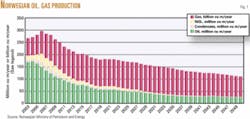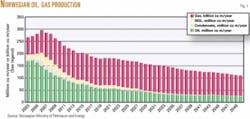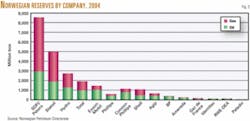Norwegian Continental Shelf emerging as an increased opportunity for investment
In February 2002 the Norwegian Petroleum Directorate (NPD) launched a campaign to promote the Norwegian sector to new-entry exploration and production firms.
Building on the success of the UK Department of Trade and Industry's efforts to attract new players to the UK Continental Shelf (UKCS), the Norwegian authorities are targeting the same North American firms that have recently entered the UK North Sea, such as Houston-based Apache Corp. and Calgary firms Canadian Natural Resources Ltd. (CNR), EnCana Corp., and PetroCanada.
Planned marketing events this year at the Offshore Technology Conference in Houston and Offshore Northern Seas in Stavanger, will see for the first time a targeted marketing effort by NPD to promote entry into the Norwegian Continental Shelf (NCS).
Although generally a less-mature province, as with the pattern of activity in the UKCS, Norwegian oil production is nearing its peak, and new discoveries are far smaller than those currently in production.
In the UK sector, much depends on the independent E&P operators as a key component of the region's future.
For Norway to best exploit its reserves, calls are being made for a more-competitive system to be put in place to attract new companies and additional investment. With numerous production and exploration opportunities in the sector, the Norwegian authorities are keen to attract "firms of substance" that have the ability and the appropriate focus to invest.
Sector evolution
Norway's oil and gas sector previously has been influenced by political forces with varying degrees of government intervention through the E&P companies Statoil ASA and Norsk Hydro AS (although both firms are switching focus to international plays).
The development of the Norwegian sector has been characterized by large amounts of capital spending, high tax rates, and rigorous operational and safety standards. Additionally, the trade union movement in the region is very strong—increasing labor costs for operational and support staff—making the sector an expensive offshore province in which to operate.
For two nations in such close proximity to one another, the evolution of the UK and Norwegian oil and gas industries has been quite different. With minimal government intervention and limited trade union presence, the UKCS is delivering high returns for the major E&P companies that have invested heavily in the region.
As measurement in the industry focuses on return on capital employed (ROCE) as opposed to production targets, the ownership structure is beginning to change as the majors divest marginal (by their return benchmarks), noncore assets.
Consequently, we are witnessing the rise in the number of independent E&P operators entering the region as producing assets and exploration licences are available to the market and barriers to entry come down.
Potential
Yet there is still much to play for. While the UK sector still has a potential 22-34 billion boe of remaining reserves, the Norwegian oil and gas sector is undoubtedly the most significant in Europe.
Since 1966, some 1,063 exploration wells have been drilled off Norway, proving 60 billion boe of reserves. Undiscovered resources are thought to be 21 billion boe, equivalent to the quantity that has been produced to date.
With oil production exceeding 3 million b/d and net gas production over 2.5 tcf/year, Norway ranks as the world's third largest exporter of oil and gas behind the Russian federation and Saudi Arabia.
At present, oil production dominates the shelf; however, this relationship is expected to change as the region develops.
The ratio of gas to oil in the reserves mix currently stands at 27%, which is expected to reverse to 77% gas by 2050. Estimates indicate that Norway has oil for 50 years and gas for a further 100 years.
Although the region has yet to go into decline like its British neighbor, there is a realization that the NCS will follow a similar path into maturity—which is expected to start, for oil at least, in 2006 (Fig. 1).
More than North Sea
Although the North Sea is the most renowned province on the NCS, the Norwegian Sea and the Barents Sea are also significant plays that differ in geology and exploration maturity.
The Norwegian North Sea is the most mature, having a well-developed infrastructure and many similarities to the UKCS.
According to NPD, the eastern part of the Norwegian Sea is relatively well-known, as several fields are in production, whereas the deepwater areas are less explored, thus representing a frontier exploration area.
The Barents Sea has been explored successfully in the south, but there are vast virgin areas in the eastern and northern parts, where, according to NPD geological and geophysical data, there are indicated large structures with petroleum potential.
The undiscovered resources in the North Sea are estimated to amount to 7.5 billion boe, and in the Norwegian Sea 7.7 billion boe—of which 66% is assumed to be gas.
In the Barents Sea, undiscovered reserves are estimated to be 6.2 billion boe.
Although there is a higher degree of uncertainly associated with these estimates, geological and seismic data indicate large structures and favorable conditions for generating and trapping hydrocarbons.
Ownership situation
The NCS has been relatively closed since the inception of the industry, with major players such as Total SA, ExxonMobil Corp., ConocoPhillips, and Royal Dutch/Shell Group effectively being bit players in the region, as the majority of reserves are owned by the state enterprise Petoro, complimented by the very strong positions of Statoil and Norsk Hydro, which collectively operate 80% of production (Fig. 2).
Although the NCS is very much a core area for both Statoil and Norsk Hydro—with expected production in 2004 of 1 million boe/d and 500,000 boe/d, respectively—the bulk of both firms' growth going forward is expected to come from international plays.
The Norwegian oil ministry also has taken steps to change the historically dominant position of these companies through partial privatization and more openness in licensing rounds, which is tempting the entry of independent E&P firms keen to exploit mature assets and expose themselves to exploration opportunities.
Calgary-based Talisman Energy Inc., Houston's Anadarko Petroleum Corp., and the UK-based firms Paladin Resources PLC and BG Group PLC all have been awarded operator licenses in 2003, while CNR International and London-based Acorn Oil & Gas Ltd. are completing their prequalification process.
The arrival of the independent community suggests that attempts by the Norwegian petroleum ministry to attract new players are working.
Overall, this should benefit the whole North Sea if new companies can be attracted to the region.
A natural step for operators in the UK would be to expand into the Norwegian sector, and vice-versa.
Taxing issues
In March, the Norwegian Ministry of Finance proposed various changes to the Norwegian tax regime that should make Norway a more-attractive place to do business.
The proposals, if approved by the Norwegian parliament, will be effective from Mar. 26, and are more sweeping than the reform of the UK system that has taken place over the last few years.
Not only will gains realized on the sale of shares by companies be exempt from taxation, but also dividends received by companies no longer will be liable to tax.
The UK introduced an exemption for gains in 2002, but it still taxes dividends received from nonresident companies.
Moreover, the UK has detailed rules that are required to be met to qualify for the exemption, whereas the indications are that the Norwegian proposals have no minimum holding period or minimum percentage ownership requirements.
In addition to these current changes, the Norwegian industry group Kon-Kraft is lobbying for further change in acknowledgment of the maturing environment.
A report published in August 2003 recommends that oil and gas taxation levels need to be lowered to attract new investment, thus creating a mutually beneficial situation for both industry and government as lower taxation stimulates increased E&P activity and overall higher tax receipts.
The current Norwegian regime imposes a 28% corporation tax, with a supplementary 50% rate for oil and gas activity.
The study suggests that lowering this supplementary rate to 10-25% is needed to ensure long-term sustainability of the nation's industry. However, the Norwegian parliament has yet to respond to these calls.
Entry strategies
For companies seeking to access the wealth that exists on the NCS, a range of entry strategies are available.
Possible options range from acquiring exploration licenses, buying shares in discoveries to be developed, or the purchase of shares in producing fields.
While the purchase of producing assets has been the historical entry method to the NCS, it is no longer necessary to buy producing assets for tax purposes prior to initiating large-scale exploration activities.
Exploration costs can now be carried forward and offset against future net income.
Additionally, a firm that has incurred losses through exploration can sell these losses to third parties.
Thus, we may witness increased entry into the NCS through licensing rounds and other exploration-led activities.
Corporate activity
Independent E&P firms continued to strengthen their presence in the UKCS in 2003, acquiring an additional 574 million boe of commercial reserves from the majors.
In all, 400 million bbl of oil was transferred, in addition to 1 tcf of gas.
Independent E&P firms and new start-ups were involved in 27 of the 28 UKCS corporate deals, which amounted to just under $2 billion worth of commercial reserves being traded.
By comparison, the Norwegian market—despite the oil ministry's efforts—remains less liquid regarding asset deals.
In 2003 some 32 transactions were announced, and of these, only 4 deals were for producing assets, the balance being license deals.
Given the dominance of Statoil and Norsk Hydro on the NCS, it is interesting to note that only 8 deals that occurred in 2003 included the two companies.
That said, according to Wood Mackenzie Ltd., Edinburgh, NCS corporate activity in 2003 displayed a continued trend of increasing involvement of both new and independent E&P players.
Statoil sold its interests in two production licenses in the central Norwegian North Sea to Paladin, while Talisman added to its growing portfolio with the purchase of BP PLC's interest in Gyda field.
ConocoPhillips sold its 15% stake in Njord field to Ruhrgas AG, marking that firm's entry into the NCS.
The growth of Swedish firm Lundin Petroleum AB's portfolio was also a feature in 2003 as the company acquired a 75% equity interest in the Norwegian start-up OER Oil AS and entered into an agreement with Det Norske Oljeselskap AS to purchase DNO's entire UK and Irish portfolios, in addition to the majority of its Norwegian assets, including Alvheim, Gyda, and Jotun fields.
The majors also participated in a number of asset transfer deals. Most notable was ENI SPA's acquisition of Statoil's share in Tyrihans, while Gaz de France purchased interests from Norsk Hydro.
North Sea issues
While issues have been raised regarding access to infrastructure in the UK sector, the Norwegian government has been keen to open up the pipeline system—particularly for gas—to all participants on nondiscriminatory, objective, and clear terms.
Its gas pipelines are operated by Gassco, an independent company.
Overall, there is a "regulated and clear-access regime" off Norway where standard terms and conditions apply to all holders of capacity.
Tariffs for the use of the upstream pipeline network are stipulated by regulation and are readily available.
Regulated transportation costs and equal rights of access ensure appropriate incentives for exploration, field development, and marginal production.
As with the UK sector, the Norwegian North Sea is littered with numerous large production platforms, some truly massive in scale.
In the future, there will be similar issues regarding the decommissioning of this infrastructure, which may attract higher liabilities than in the UK.
Decommissioning has been a major issue for independent E&P operators on the UKCS, as the liabilities erode balance sheets and constrain access to appropriate finance for smaller investors.
Given the scale of some of the offshore platforms in the Norwegian sector, it may be hard for the independents to enter the region through production-based acquisitions.
Exploration plays
Norwegian exploration policy has favored a gradual opening of exploration areas through licensing rounds, offering opportunities for majors and independents to establish a balanced portfolio of acreage in mature, frontier, and virgin areas.
This has been highlighted by the increased interest shown in the 18th licensing round for frontier areas in the North Sea and the Norwegian Sea. The Norwegian authorities believe there remains major undiscovered hydrocarbon reserves on the unexplored areas of the NCS.
Therefore, there is an emphasis on applicants to undertake rapid and efficient exploration.
To date, some 18 companies have applied for blocks—8 more than participated in the 17th round. These are Amerada Hess Corp., BG, ChevronTexaco, Denmark's Dansk Olie & Naturgas AS, DNO, ENI, ExxonMobil, GDF, Idemitsu Corp., Marathon Corp., Norsk Hydro, Paladin, RWE-DEA, Shell, Statoil, Total, and small Norwegian firms Petroleum Geo-Services ASA's Pertra AS and Revus Energy AS.
The Ministry of Petroleum and Energy aims to award new production licenses this quarter in the second quarter.
Before an organization can enter the Norwegian sector, it first must be "qualified" by the Ministry of Petroleum and Energy.
This system, introduced in 2002, has been set up to determine the suitability of new players' sustainability on the NCS, with the paramount benchmark being the "ability to contribute to the creation of value." Firms need to demonstrate a minimum level of competence in all relevant fields in order to evaluate, understand, and follow up the operators' activities on the production license.
While an organization may outsource many of these functions, there are stringent requirements in order to demonstrate sufficient in-house ability and expertise regarding health, environment, and safety. These elements are in conjunction with the necessary financial requirements to satisfy any commitments assumed as licensees in any license.
However, the choice between buying production relative to other entry methods will depend on several factors in relation to the overall corporate strategy of the firm.
Elements such as the required rate of return, the likelihood of having to sell losses at a discount, or the ability to raise capital and operate with losses over time until they can be utilized, all will affect the entry strategy to be adopted.
Overall, the Norwegian oil and gas sector can be seen as a good opportunity for E&P companies seeking to invest.
Although the resource situation is significant, there are still hurdles to overcome.
The efforts of Norwegian stakeholders to make the province more attractive to inward investment will take time to realize. Yet it is encouraging that the sector has recognized the need to change, and that inward investment will be key to the success of the region.
Let's hope this momentum builds to the benefit of the Norwegian sector, and the benefit of the North Sea as a whole.
The author
Derek Leith ([email protected]) is the UK head of oil and gas taxation at Ernst & Young LLP. Based at the firm's Aberdeen office, he works with a large number of companies with a presence on the UK Continental Shelf, from the supermajors and majors to recent start-ups. He advises extensively on UKCS tax issues, as well as cross-border structuring and financing. Before joining Ernst & Young, Leith worked as a tax adviser for BP Exploration PLC. He is a former member of the steering group of the UK Oil Industry Taxation Committee (UKOITC), a former chairman of UKOITC Professional Sub-Group, and a past UKOITC secretary. A graduate of Aberdeen University, he is a fellow of the Chartered Association of Certified Accountants, and a member of the Chartered Institute of Taxation. He has 19 years' experience in taxation.


